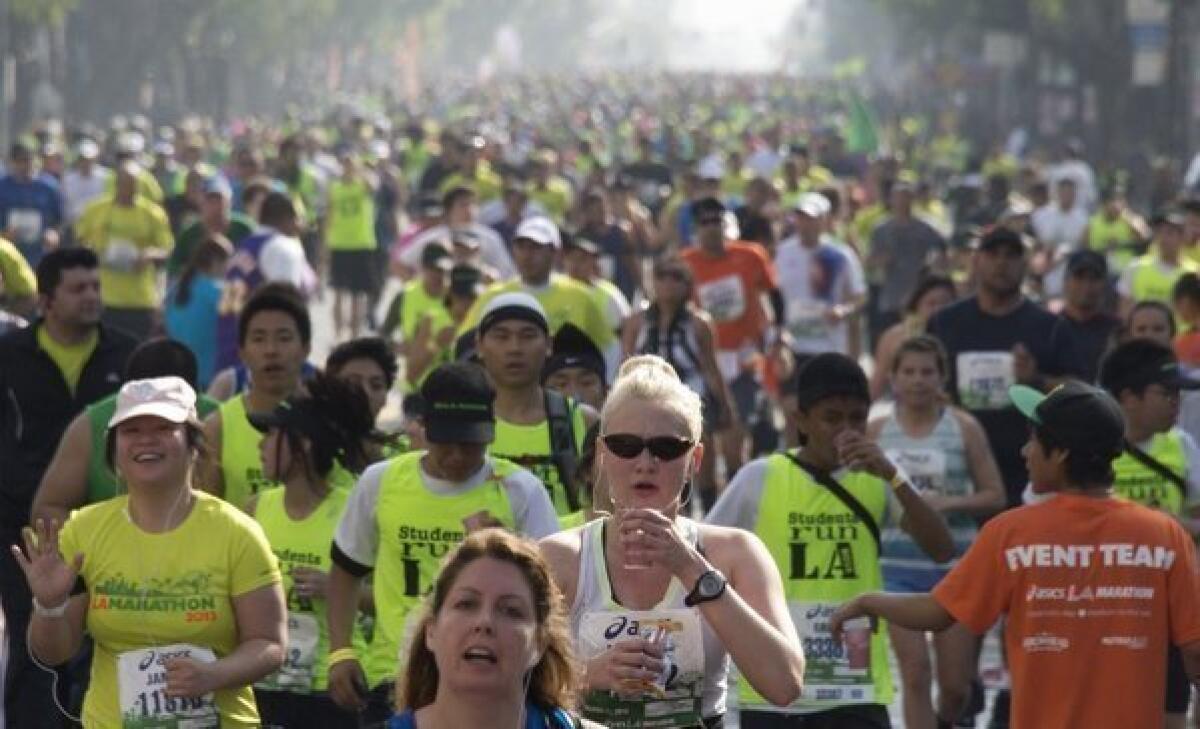L.A. Marathon: Angry drivers vs. elated runners

- Share via
The L.A. Marathon, which was held Sunday, has in the past brought me both joy and anger: joy, as a first-time race finisher in 2011, when a brutal late-winter storm that dumped buckets of rain and buffeted runners made meeting my goal time feel especially satisfying; and angst, as a driver caught in unbearable-even-for-L.A. traffic because of the street closures that allow more than 20,000 runners to jog safely through the city.
Both experiences are hard to relate to anyone who hasn’t gone through them. There’s no way to capture the catharsis of crossing a finish line after months of life-consuming training, enduring the crippling pain and exhaustion that make the final six miles of a marathon more difficult than the first 20, and being lifted up and encouraged by thousands of complete strangers as if you were batting cleanup at Dodger Stadium.
Had I written a letter to The Times while still on a runner’s high after finishing, it would have been similar to what Studio City resident Tom Jones sent to [email protected]:
“I ran my first L.A. Marathon this past Sunday and wanted to share my thoughts on the people who lined the streets in support of not only specific runners, but for complete strangers as well.
“I normally listen to music as I run, but Sunday was different. I knew there would be people along the course making noise and taking in the spectacle, but I never imagined so much support. The entertainment, the volunteers, the small business owners and everyday citizens who passed out refreshments, the police and fire personnel, the youth groups screaming their heads off and the group that touched me most, made up of people from a school for the blind, moved me greatly.
“Amazingly, my iPod stayed in my pocket until mile 17, when I needed a little something extra. However I quickly put it away again as I neared the finish. To all of you who volunteered your time, to those complete strangers who came out to cheer us on, thank you for making my first L.A. Marathon a memorable experience. Your presence matters, and you exemplified what makes this region so very special.”
But just as much as finishing a marathon can be a life-changing experience for runners, negotiating the race-day traffic can break any hardened commuter.
Following the 2006 race, which started and finished in downtown L.A., I offered to drive my girlfriend, who cheered her sister on at the finish line, back to her apartment. Five people, including a chatty 7-year-old, packed into my compact VW for the quick six-mile drive to the Miracle Mile. But the drive was anything but quick. We arrived three hours later, my nerves frayed and my passengers wishing I’d bought a bigger car. It couldn’t have been too bad for everyone; my girlfriend did eventually become my wife, after all.
Reader Keith Pittel had a similar experience during Sunday’s marathon:
“I, like thousands of others, endured the pain of another marathon. We faced traffic diversions that took us almost a marathon’s distance out of our way and traffic delays almost as long as it takes to run 26 miles. Thus we endured all the pain and suffering of running and we didn’t even get a T-shirt.
“Since Honda is not the lead sponsor this year, I may consider buying one of its cars in about 10 years, after I recover from the pain it caused. I certainly will not buy anything from Asics, this year’s lead sponsor.”
Pittel and other like him have a point. City streets are meant to facilitate commutes to work, access to businesses and other activities that allow people to live normal lives. So when crucial arteries are shut down for events unrelated to driving -- think movie or TV shoots, red-carpet parties like the Oscars and, yes, marathons -- people miss appointments and flights, among other inconveniences. They’re understandably upset.
But cities should exist for more than just car trips, and Los Angeles is built as if this isn’t the case. Almost any event intended to encourage a sense of culture and community -- and the L.A. Marathon certainly qualifies -- requires gridlock-inducing street closures. Yes, the L.A. Marathon is uniquely disruptive, but it’s one of those rare occasions (very rare -- once a year, and on a Sunday morning) when people all across the region are given an opportunity to share a common experience.
Here’s one way to look at this: At its core, the marathon’s commuter vs. runner conflict comes down to the age-old battle between drivers and walkers. In that sense, the L.A. Marathon is, well, so L.A.
ALSO:
The Catholic Church and Argentina
Sens. Ted Cruz and Dianne Feinstein face off on gun control
More to Read
A cure for the common opinion
Get thought-provoking perspectives with our weekly newsletter.
You may occasionally receive promotional content from the Los Angeles Times.











